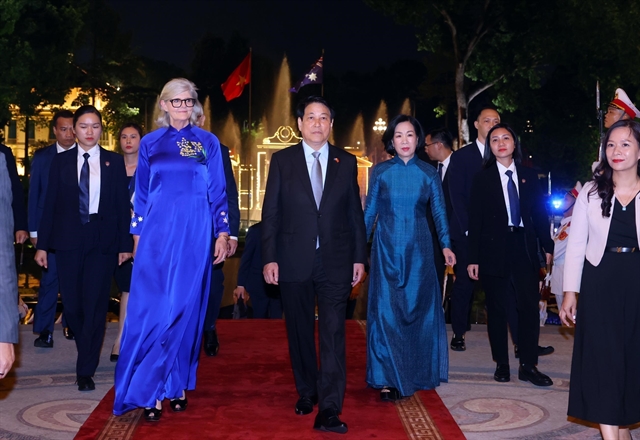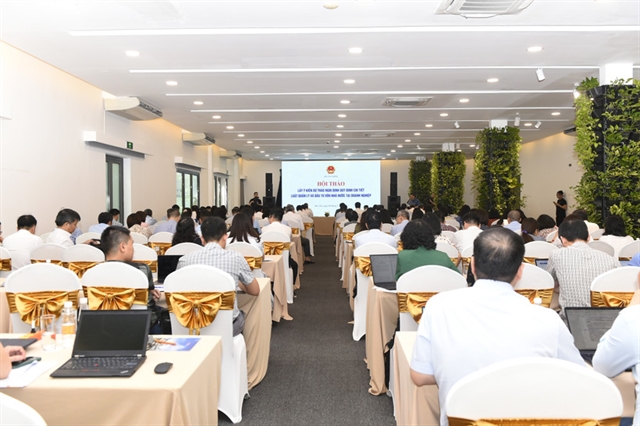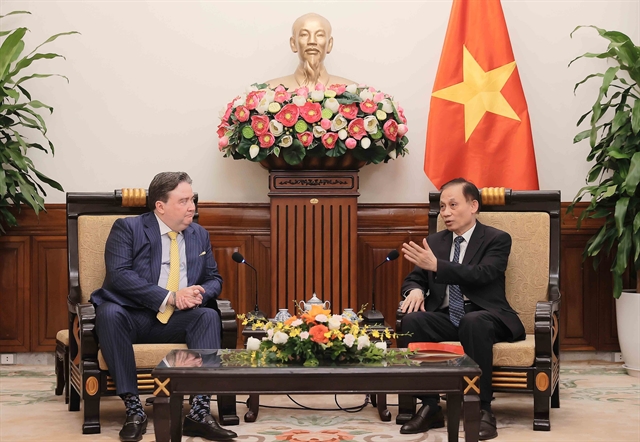 Economy
Economy


|
| Participants at the workshop on the implementation of the Law on Management and Investment of State Capital in Enterprises on July 9, 2025. VNA/VNS Photo |
HÀ NỘI — The Ministry of Finance (MoF) held a consultation workshop yesterday in Hà Nội to gather feedback on draft decrees detailing the implementation of the Law on Management and Investment of State Capital in Enterprises, which aims to update the governance of State-owned enterprises (SOEs).
The workshop is an important preparatory step to ensure the legislation, also called Law 68/2025/QH15, is implemented in an effective manner when it takes effect on August 1.
Speaking at the opening of the workshop, Deputy Minister of Finance Cao Anh Tuấn said the law was developed with a new approach that clearly distinguishes the functions of State management from those of ownership and enterprise operations.
According to Tuấn, the legislation reflects a change in the governance of SOEs by enhancing autonomy in investment decisions and separating State management functions from those of capital ownership and enterprise operations. In particular, the law aims to reduce direct intervention by State ownership representatives while strengthening delegation and oversight to promote autonomy and accountability.
To prepare for implementation, the MoF has drafted three decrees: one regulating certain aspects of State capital management and investment in enterprises, another on supervision, inspection, evaluation, classification, reporting and disclosure in State capital management and investment, and one on the restructuring of State capital in enterprises. The drafts build on existing regulations that remain relevant while adding and refining provisions to address practical challenges faced by SOEs in recent years.
At the workshop, representatives from enterprises offered candid and detailed feedback. Phạm Anh Tuấn, Deputy Head of the Finance and Accounting Department at Saigon Newport Corporation, said the purpose, funding source, urgency and criteria for determining need when proposing additional charter capital for SOEs should be clearly defined. He proposed that investment documents should explicitly define the expected socio-economic efficiency of their investment. Additionally, there should be clear guidance in cases where capital is supplemented to carry out political tasks assigned by authorities, to avoid confusion or legal uncertainty.
Regarding expenses for political tasks, including public communications, event organisation or support for localities, Tuấn suggested having clear guidance so such costs can either be excluded from taxable income or accounted for separately, ensuring they do not distort the evaluation of business performance. For defence and security-related enterprises, he recommended developing a separate financial mechanism suited to operational realities, ensuring overall efficiency.
Deputy General Director of VNPT Nguyễn Đình Danh said the group is currently implementing several overseas investment projects, some of which have generated returns, while others are still in preparation and not yet profitable. He proposed evaluation and classification regulations for SOEs in such cases, especially for long-term strategic projects.
According to Danh, for enterprises operating in specialised fields such as telecommunications and information technology, investments in digital infrastructure and research and development are essential. However, these sectors typically have long capital recovery cycles, and if evaluated solely on short-term financial metrics, their true value may not be reflected. Therefore, VNPT proposed that SOE performance indicators be categorised by industry and sector. For technology enterprises specifically, criteria should include the level of digital infrastructure development, social impact and contributions to the national digital transformation strategy.
VNPT also noted that some current regulations do not account for digital assets, shared infrastructure or data value — factors that play an increasingly important role in the ICT sector. The group proposed that these be promptly incorporated into State capital management policies to meet development demands in the current context.
Deputy Minister Tuấn emphasised that innovations in the law and its guiding decrees will help unlock existing resources within SOEs, establish a modern and effective legal framework, and enable SOEs to continue playing their key role as a driving force in the State economy, while also promoting development across the broader economy and business community. VNS




